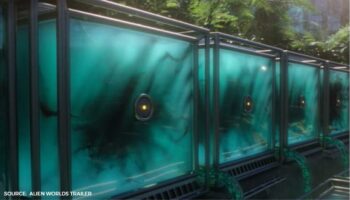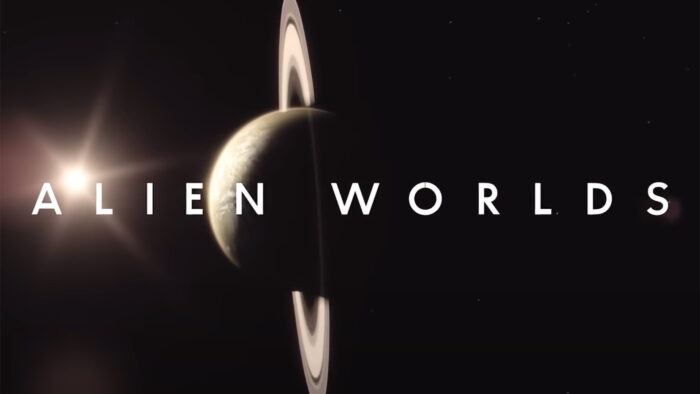‘Alien Worlds’ Shares Fantastic Yet Bleak Sci-Fi
The Earth. Home to millions of species. But what might live … beyond?
So begins Netflix’s fantastical sci-fi nature docuseries Alien Worlds. It’s a feast for the eyes and mind, rearranging scientific observations about our world into fascinating scenarios on imaginary planets beyond.
The cinematography is excellent with high-resolution graphics. The scientists are knowledgeable and down to earth. Our narrator’s melodious voice lends a lullaby-like element to the series, as if she’s reading you a story while you lie in bed. To further titillate the mind, the CG animation is high-quality.
Attention: Spoilers ahead!
 The four-part mini-series explores what alien life and life-forms may be like on four fictional planets.
The four-part mini-series explores what alien life and life-forms may be like on four fictional planets.
The series comes from a macro-evolutionary bias.1 I noticed an interesting theme that I will share later.
Over four thousand exoplanets (planets that exist outside our solar system) have been discovered. This leads to a rather exciting thought that trillions of planets exist in the universe. Does alien life exist on those worlds? How would the different compositions affect the evolution of alien life?
Focusing mainly on alien life in two categories: predators and grazers (prey), we take a glimpse into the unknown.
The four planets of Alien Worlds
Atlas
 Our first fictional world, Atlas, portrays how alien life may evolve on a world that is double the size of Earth, with twice the gravitational force. The evolution of the species is centered on surviving this dense environment.
Our first fictional world, Atlas, portrays how alien life may evolve on a world that is double the size of Earth, with twice the gravitational force. The evolution of the species is centered on surviving this dense environment.
Through the view of a professional paraglider floating on air currents, we learn about the thermal layer of gravity. Falcons show us how they use the force of gravity to drop onto prey from the sky.
On Atlas, our grazers, the six-winged herbivores never land. Our predators, bug-like bad boys use hydrogen-producing bacteria to inflate their sacks and attack from the skies. However, Atlas’s greater gravitational force lures asteroids. Could these species survive an asteroid impact?
Janus
Janus is a planet locked into orbit around its red dwarf sun. One side is in perpetual day and the other endless night with an eternal sliver of twilight in the center. How would alien life evolve to live in extreme environments?
Back on Earth, we follow the leaf cutter ant colony with a polyphenic trait that allows for different types of ants to arise from one genotype. Or, to put it in Parker-speak, they all come from the same larvae but based on diet, genes are switched off and on to provide the colony with the type of labor needed—workers, foragers, and soldiers.
The ten-eyed hermaphrodite pentapods of Janus are the dominant form of life. Born in the twilight, they use the winds to scatter their spawn across the planet. Whether they land in sunlight, moonlight, or twilight, the pentapods’ survival is guaranteed because they adapt to the environment.
Eden
 Eden orbits two stars and boasts of high oxygen levels and an axis tilt of 31 degrees. Under these conditions, life thrives, leading to greater competition among the species. Predators get better at hunting; prey get better at running.
Eden orbits two stars and boasts of high oxygen levels and an axis tilt of 31 degrees. Under these conditions, life thrives, leading to greater competition among the species. Predators get better at hunting; prey get better at running.
Guppy fish provide an example of an animal who reproduces based on the level of predation in their area. Lots of predators lead the guppy mama to produce numerous small babies. If the level of predation is low, the guppy mama gives birth fewer and bigger babies.
The grazers on Eden are too busy trying to survive to take time to date. Instead, they release worm-like spawn which goes in search for a partner and fuse together to create a cocoon that soon lifts into the trees to protect the young from predators.
Terra
Terra is a dying world whose sun has grown bigger and brighter as it aged. Due to this, the world is barren, but the formless advanced intelligent species lives in artificial domes and are serviced by robots. Their sun’s volatility causes them to have to relocate to another planet further away.
Scientist states that the future of energy consumption will shift to using the sun’s energy to power our civilization. Showcasing the Noor Solar panel plant, it gives us a glimpse into a possible future of maximizing the use of our star.
The citizens of Terra use their sun’s energy to help manufacture a new world further out in their solar system. Thus, the star that ends their life on Terra makes it possible for them to live on new Terra.
Analysis and underlying theme
Each planet is used to highlight how evolution would possibly shape alien life. On Atlas, evolution shaped the life due to the planet’s unique characteristics. Janus’s alien life evolved based on the characteristic of its proximity to the star. Eden’s alien life evolved due to an abundance of optimal conditions on their world. The inhabitants of Terra evolved to where they no longer need bodies and thus, are free from the clutches of evolutionary processes.
In every scenario, the focus is on survival. I couldn’t help but wonder if the writers and makers knew of the rather dismal outlook they poured into this otherwise fantastic series. All life is only here to survive.
This is clearly seen on the last planet, Terra. This hypothetical race of super intelligent beings had evolved to where they no longer needed their bodies. They existed in artificial domes in square boxes as “neural tissue.” As the narrator points out, “They never age. They never die. Each is an individual but are connected to think as one. A hive mind. They are monitored and maintained by robots.”
Perhaps all the other planets were still in the process of evolving, and the Terran inhabitants reached the pinnacle of their development.
 As I sat watching these inhabitants, I mourned for them. Do they create works of art any more? Does someone sing a song or tell stories any more? Did they have family barbecues or witness the wonder of the birth of a newborn baby? Do they even care anymore about exploring the universe as we are so excited to do? Or, were they just focusing on surviving in smarter ways? And, with highly intelligent robots doing all the work, I guess they have nothing else to do but—be fed glucose from plants.
As I sat watching these inhabitants, I mourned for them. Do they create works of art any more? Does someone sing a song or tell stories any more? Did they have family barbecues or witness the wonder of the birth of a newborn baby? Do they even care anymore about exploring the universe as we are so excited to do? Or, were they just focusing on surviving in smarter ways? And, with highly intelligent robots doing all the work, I guess they have nothing else to do but—be fed glucose from plants.
Is this the utopia of the evolutionary process? If it is, count me out.
As I listened to this, I couldn’t help but think how differently God speaks of our existence:
- God created the Earth to be inhabited (Isaiah 45:18).
- We have stewardship (Genesis 1:26).
- God created us for relationship with him (Genesis 3:9).
- After humans disobeyed God, he cursed creation (Genesis 3:17).
- He speaks of the bad times we’ll have (John 16:33), the good times we’ll have (John 10:10), and our temporary existence (Psalm 90:9-10).2.
- Our new bodies to come (1 Corinthians 15:50-52).
Life is about more than survival.3
Alien Worlds was a great and thoughtful exercise of what possibly lies beyond. For writers, it gave a decent framework for practicing world-building for galactic exploration, advanced civilizations, and colonization. For Christians, the series showed a wonderful look at creation in glorious detail. But when Alien Worlds focused on survival as the only reason to exist, it showed dismal weakness.
Which alien world did you like the most? What does your alien world look like? The series focused on predators and prey, but what would you have done differently? What places on Earth might seem truly alien? Share your thoughts.
- I do not adhere to that school of thought, but still found the show enjoyable. ↩
- After seeing the inhabitants of Terra, thank goodness! Another thought I had was that these inhabitants without bodies do not experience the pleasures we have of the temporal world—basking in sunlight, playing in the water, eating fried chicken, and the intimate connection of human touch. How sad! ↩
- I am reminded of the movie, A Quiet Place, where blind alien monsters attack. The mom and dad, in the beginning of the movie, lost their son to one of the aliens. A year later, we find them pregnant with another child. Fans had plenty of discussion about how irresponsible the mom and dad were to get pregnant in a world full of man-killing aliens. But, I have to wonder: are we only meant to survive? Or, are we meant to thrive? Some people swear that the blind, random, macro-evolutionary process is beautiful. Yet, as depicted in the series there was nothing beautiful about it. ↩







































I dunno, most church culture I’ve seen is as bleak as your ascribed version of evolutionary philosophy. The early-twenties are shunted off into extended youth-group-land until they marry/have babies, and then they finally have something in common with the little old ladies to make conversation about.
Couples classes are almost entirely about child-rearing IN THA LAWD with some side forays into keeping your marriage intact under the pressure. It feels like just as much of a pyramid scheme as ascribed evolutionary thought.
Welp, I don’t completely agree that an evolutionary process is ugly–sexual selection is very interesting and I think the fact that it’s routinely equated as being the same as “survival of the fittest” is highly misleading. It is not the same thing. Even if there were no survival pressures–even if the number of creatures who die exactly matched those born and all could eat from non-sentient food like plants without any struggle for survival, sexual selection would happen anyway and create new species anyway. Because sexual selection isn’t directly connected to survival from what can be proved about it. And does produce some truly beautiful things.
However, the idea that the entire universe is essentially purposeless, and that life just springs up for no reason, no purpose, and that life by its nature has to annihilate other life to survive, at least sometimes, coupled with whether a species lives or dies being largely random–yeah, that’s not a pretty idea at all. It’s much more comforting and beautiful to think of God having a plan, even when things seem bleak.
As for Christianity, the most important thing it offers is direct connection to God, not church culture. Knowing the Almighty through study of the Bible and history and science and connecting to the Almighty in prayer. Church can be fun sometimes but it doesn’t provide what Christians really need. Nor can it. It should train people in the Bible and knowing God and some practical matters like family as a secondary thing. Collective worship can be very satisfying, but the primary worship of every Christian should take place in the heart in my opinion. And of course, the most important thing church offers is the opportunity to serve others.
Church culture is not the be-all of Christianity, in other words. It’s just one element. But that element should not be bleak–there’s nothing bleak about serving others…in my opinion of course, but I think I’ve been blessed to do things in the right way and what you were exposed to when you were younger missed the point…
lol, I guess you’ve convinced me you’re not a Calvinist if you don’t hammer on the importance of corporate worship.
Side note: I think “survival of the fittest” has been corrupted in popular thought. It shouldn’t be “survival of the physically fittest, as in strongest” but more like “survival of the fittest to suit the ecological niche.”
More on topic: The idea of direct connection to God is nice, but it’s a waaaaaaaaaaay abstract idea that has way less traction than the societal pressure to produce your 2.5 sproglets.
Also no one seems to agree on what the heck that actually means. Is it an emotional high? Doing peyote is a more reliable way of getting what you’re after than reading the same 66 books of scripture for your entire life (while avoiding the scholarly approach that makes the orthodox pitchforks hungry for heresies).
I already told you I’m not a Calvinist. You just didn’t quite believe me.
Not to say corporate worship has no value, it does, but individual worship matters most. Individuals matter most–the Gospel was preached to individuals and individuals either do or do not believe. Yes, the individuals assemble into a larger body with a purpose–but the most important part of that purpose, in my view, is serving one another rather than worship or anything else (like teaching, which is also good, but not as essential as serving–though teaching should be a form of service, actually).
As for what people think about a connection to God–it doesn’t matter to me that people don’t agree. This is part of my daily life, something I experience often. I could describe in detail but won’t at this moment. But the connection with the Almighty is what Christianity is about–not church culture, whatever you seem to think is more powerful but actually is much less significant.
That you haven’t experienced what I’m talking about is a strong argument that you are not a Christian and never were. Though I do acknowledge the possibility of someone having personal faith and not really connecting with God, I’m doubtful that happens much. The heart of faith IS the believer meeting God in one way or other.
Peyote? Gimme a break. I don’t hallucinate God and don’t want to. I’m not talking about being doped up here…I’m talking about the human mind working the way it was designed to work, not lamely limping along propped up by chemicals we ingest…
Thank you so much for responding.
I wasn’t sure how to respond to your comment because I have a different experience than what you’ve laid out here. The bigger emphasis was having a relationship with the Lord, not the church.
As far as the evolutionary philosophy, the whole idea of not needing our bodies anymore because physical form limits is something I’ve seen numerous times in fiction and non-fiction. So it’s not something I’ve ascribed to it as much as what I’ve seen illustrated in various medium.
Heck, I dunno your denominational background or what you/they mean by “relationship with the Lord” and how that might be different from the Southern Baptist background radiation I acculturated in. Congratulations on avoiding it, I guess?
I’m familiar with transhumanist ideas, but it’s just the context you’re putting it in that I find issue with. Is it actually inevitable that we seek to become unbodied? Transhumanists are only a small subset of people who accept an evolutionary mindset (which is most of everybody, so that’s a lot of variety under the tent). Most of the peeps I hang around prefer the solarpunk or cottagecore vision to the cyberpunk vision, but they are the organic DIY weirdoes who handsew historically accurate poofy shirts and refer to themselves as aesthetic trash.
Thanks Parker! I was looking for just this kind of creative thinking to stir some writing activity. I watched the NatGeo produced Cosmos series earlier this year hoping for more of the fantastic/creative and found it lacking in that department. As a kid, I had a well-worn copy of “The New Dinosaurs” that took a similar tactic: how might things have turned out if [circumstance] was [ changed in this way]? It didn’t impact my faith in a negative way, but certainly allowed the creative side of my brain to raise the same kind of questions (what if?) and brought me back to many of the same conclusions you came to about the nature of the universe as God created it and our attitude toward it.
I really like documentaries that invent their own ecosystem/scenario for different planets, so thank you for sharing 🙂 Hopefully I’ll remember it for if I ever get a Netflix subscription.